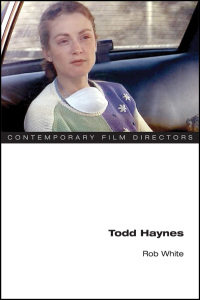 Todd Haynes: Contemporary Film Directors
Todd Haynes: Contemporary Film Directors
by Rob White
Univ. of Illinois Press. 176 pages, $22.
THIS SERIES, “Contemporary Film Directors,” has proven a brilliant way for different writers to assess, analyze, and illuminate the work of a single filmmaker. Highlights of the series include James Morrison’s book on Roman Polanski, Sean O’Sullivan’s take on Mike Leigh, and Emma Wilson’s on Atom Egoyan. These are now joined by Rob White’s in-depth examination of one of the most vital filmmakers identified as part of the New Queer Cinema movement, Todd Haynes, whose best-known movies include such transgressive entries as Poison (1991), Safe (1995), and Far From Heaven (2002).
White sensibly devotes as much time and consideration to Haynes’ short films as he does to the features. The first film to garner the critics’ attention was Superstar: The Karen Carpenter Story, the wildly inventive short film in which Barbie and Ken dolls play superstar singers Karen and Richard Carpenter. When the film toured the festival circuit in 1988, it set off a sensation for the way in which the film evoked pathos despite its bizarre æsthetic, which White refers to as the “Barbification” of the Carpenter family narrative. The film’s cachet only grew when lawyers representing the Carpenters stepped in and blocked Superstar’s distribution, meaning it became essential underground viewing on VHS bootleg tapes. (Thanks to the age of the censorship-defying Internet, on-line copies of the film are no more than a Google search away.)
What’s intriguing are the ways in which you can see so much of Haynes’ style already bursting out in this ultra-low-budget, quirky—and undeniably gimmicky—film. As White notes, Superstar relies heavily on the rich history of the film melodrama genre, showing us how social constraints and the pressures involved in fame and the nuclear family unit drove Carpenter into a fatal spiral of eating-disordered hell.
Critics and academics alike have been criticized for clinging too tightly to the “auteur” theory, the idea that a director is really the central creative force behind a film and is thus its author. But in Haynes’ case, the theory is applicable, so distinctive is his style, his æsthetic, and so consistent his themes. Author White ties the elements of Haynes’ œuvre together beautifully, taking us through each film methodically, leaving no theme or idea untouched. And that’s a huge task, given that Haynes is a writer-director who manages to be both highly cerebral and terrifically playful at once.
White does an admirable job of making connections between all of Haynes’ works, noting that his thematic ideas often bleed into his style, in particular in the ways in which he lays bare his films’ own artifice. In that respect, the sets in Far from Heaven seem every bit as artificial as the ones in Superstar. In addition, White conveys the epic complexity of Haynes’ films. Here is a director, after all, who has been profoundly influenced by film history, whose films touch on a broad range of cultural landmarks while relying most heavily on melodrama, in particular as deployed by Fassbinder, Ophuls, and especially Sirk. White goes even further, drawing his own connections between Haynes’ work and statements attributed to Van Gogh, The Silence of the Lambs, Margaret Atwood’s dystopic novel The Handmaid’s Tale, and even the animated feature Watership Down. Much like a Haynes film, White’s book is an energetic, hallucinogenic jaunt through pop culture.
Those who consider themselves Haynes freaks (and I count myself among them) know that he gives a fantastic interview, so White is smart to include a conversation with the filmmaker. In it, Haynes discusses his admiration for Hitchcock, which runs so deep because his work “is so radical and subversive and yet so mainstream and popular at the same time.” It’s a revealing comment, as Haynes, like Hitchcock, often features flawed, ordinary characters thrust into extraordinary circumstances.
White’s book is an exhaustive overview of Haynes’ strange, melancholic body of work. And it is that rare thing: a book about films that matches the wit, subversiveness, and emotional complexity of the œuvre under discussion.
________________________________________________________
Matthew Hays, author of The View from Here: Conversations with Gay and Lesbian Filmmakers, teaches film studies at Concordia University.






